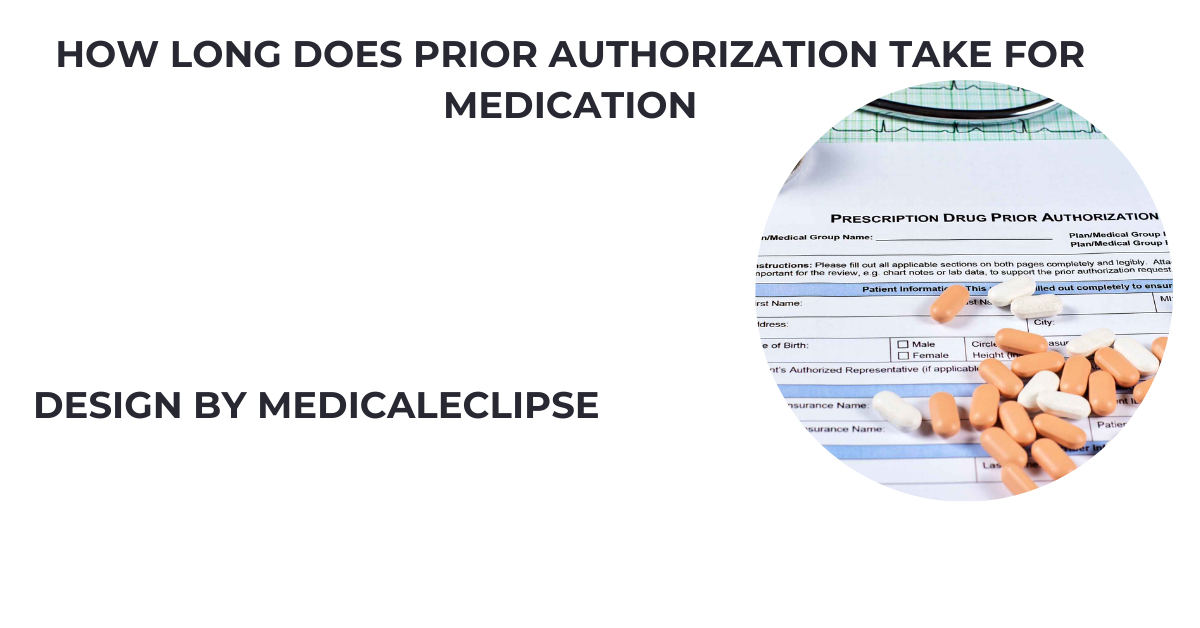Prior authorization for medication typically takes 2 to 7 business days, but urgent cases can be expedited to 24-48 hours.
In this article, we will discuss what prior authorization is, why it’s needed, how long it takes, and what you can do to expedite the process.
What is Prior Authorization?

Prior authorization is a requirement from insurance companies to approve coverage for certain medications, treatments, or procedures before they are prescribed or provided. Insurance companies use this process to ensure that the treatment or medication being requested is medically necessary and appropriate for the patient’s condition.
This process is often required for brand-name medications, specialty drugs, or high-cost treatments that may not be covered under a patient’s insurance plan unless approved through prior authorization. For example, if a doctor prescribes a medication that is expensive or not included on a patient’s insurance formulary, the insurance provider may require additional documentation or review to approve the medication.
Why Is Prior Authorization Needed?
Insurance companies implement prior authorization to help control healthcare costs and ensure that treatments or medications are used appropriately. Some of the reasons prior authorization is needed include:
- Cost Control: Insurance companies aim to ensure that more affordable or generic medications are tried first before approving expensive treatments or brand-name medications.
- Medical Necessity: Prior authorization helps verify that the prescribed medication is necessary for the patient’s condition and that alternative treatments have been considered.
- Formulary Restrictions: Some insurance plans may only cover certain medications that are listed in their formulary. If a medication is not on the formulary, prior authorization may be required for approval.
How Long Does Prior Authorization Take?
The timeline for prior authorization can vary based on several factors, including the insurance company, the type of medication, and the complexity of the request. On average, the process can take anywhere from 2 to 7 business days. However, in some cases, it may take longer if the insurance company needs additional information or if there is a backlog in processing requests.
Here are a few key timeframes to keep in mind:
- Standard Requests: For most medications, the insurance company has up to 3 to 5 business days to make a decision after receiving all required information.
- Expedited Requests: In cases where the medication is necessary for urgent medical reasons, such as preventing a severe health outcome, the process can be expedited. In these cases, the insurance company may make a decision within 24 to 48 hours.
- Appeals: If a prior authorization is denied, the process can take longer. The appeal process can take up to 30 days or more, depending on the insurance company and the nature of the denial.
Also Read: Ketamine as a Treatment for Depression
What Can Cause Delays in Prior Authorization?
While the standard processing time is typically a few business days, several factors can cause delays in the prior authorization process:
- Incomplete Documentation: If the healthcare provider doesn’t submit all necessary information, such as medical records or clinical notes, the insurance company may request additional documentation, causing delays.
- High Volume of Requests: Insurance companies can experience backlogs during periods of high demand, which can extend the processing time.
- Need for Additional Reviews: If the insurance company needs a second opinion from a specialist or requires additional clinical data to support the prescription, the process can take longer.
- Medication-Specific Reviews: Some medications, especially high-cost specialty drugs, may require more extensive reviews, leading to longer waiting times for approval.
How to Expedite the Prior Authorization Process?

There are several steps you can take to help speed up the prior authorization process:
ensure Complete Documentation:
Make sure your healthcare provider submits all the necessary paperwork and supporting documents, including medical history, diagnosis, and reasons why the prescribed medication is necessary.
Communicate with Your Insurance Company:
Stay in touch with your insurance company to ensure they have received the prior authorization request and to check on its status. Some companies offer online portals for tracking requests.
Request Expedited Processing:
If the medication is urgent, your healthcare provider can request expedited processing to speed up the approval process.
Follow Up on Denied Requests:
If your prior authorization is denied, ask your provider to appeal the decision. Having additional documentation or alternative treatment plans can sometimes help overturn the denial.
Check for Alternatives:
If the process is taking too long, your doctor may suggest alternative medications or treatments that don’t require prior authorization, which can reduce delays.
Also Read: How to Recognize the Physical Symptoms of Anxiety
What Happens After Prior Authorization is Approved?
Once your prior authorization is approved, your medication will be covered by your insurance plan, and you can proceed with filling the prescription. It’s important to check with your pharmacy to ensure that the medication is available and covered after approval.
If the request is denied, your healthcare provider will be notified, and you may have the option to appeal the decision or explore alternative treatments.
FAQ’s
1. How long does prior authorization take for medication?
It usually takes 2 to 7 business days, but can be expedited for urgent situations.
2. What can cause delays in the prior authorization process?
Delays can occur due to incomplete documentation, high volume of requests, or additional reviews required by the insurance company.
3. Can the prior authorization process be sped up?
Yes, it can be expedited if the medication is medically urgent, often resulting in approval within 24 to 48 hours.
4. What happens if my prior authorization is denied?
If denied, you can appeal the decision or explore alternative treatments, which may also require authorization.
5. How can I check the status of my prior authorization request?
You can contact your insurance company or use their online portal to track the progress of your prior authorization.
Conclusion
While the prior authorization process can take anywhere from a few days to several weeks, understanding the steps involved and how to navigate the process can help you manage your healthcare more efficiently. By ensuring that all documentation is complete, staying proactive with your insurance company, and exploring expedited options when necessary, you can reduce delays and get the medication you need in a timely manner.

Leave a Reply